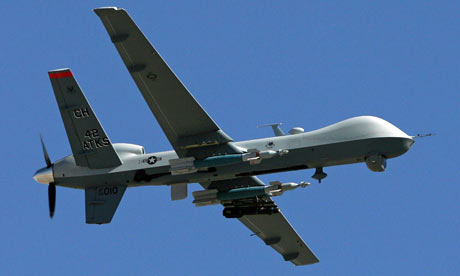US drones hacked by Iraqi insurgents
• $26 (£16) software let militants view potential targets
• American official says flaw was identified and fixed
One of America's most sophisticated weapons in the conflicts in Iraq, Afghanistan and Pakistan, the unmanned drone, has been successfully penetrated by insurgents using software available on the internet for $26 (£16).
Insurgents in Iraq intercepted live video feeds from the drones being relayed back to a US controller and revealing potential targets. A US official said the flaw was identified and fixed in the past 12 months.

Insurgents in Iraq used software such as Skygrabber to hack into American drones. Photograph: Ethan Miller/Getty
The problem only came to light after the US found many hours' worth of videotaped recordings on militant laptops late last year and earlier this year.
The insurgents used software programmes such as Skygrabber, developed by a Russian company and originally intended to download music and videos from the internet.
The drones have become one of the most important parts of the US armoury. Their use has increased sixfold over the past five years. They are able to hover over suspect sites and launch missiles against alleged militants in Iraq and alleged al-Qaida and Taliban militants in Afghanistan and the Pakistan border region.
The use of the drones in Pakistan is particularly controversial, in part because some Pakistanis see it as US infringement of the country's sovereignty, but also because civilians are often hit too.
The potential problem with the hacking was that insurgents, if they knew the locations being targeted, would be able to take evasive action.
A US source with knowledge of the programme today confirmed the report, first disclosed by the Wall Street Journal, but said that the quality of the pictures seen by the insurgents would have been of limited value. The pictures would have been fuzzy, making it nearly impossible to determine the location of a target in the deserts or mountains, the source said.
The US air force is responsible for drones in Iraq and Afghanistan, and the CIA for those in Pakistan. The CIA video feeds are reported to have been encrypted, while some of the air forces ones were not.
The Pentagon had been aware of the problem for many years, but had assumed the insurgents would not have the technical knowledge to intercept the feeds.
Air force Lieutenant General David Deptula, deputy chief of staff for intelligence, surveillance and reconnaissance, said: "Any time you have a system that broadcasts information using omnidirectional signals, those are subject to listening and exploitation. One of the ways we deal with that is encrypting signals."
When asked about the problem, a Pentagon spokesman, Lieutenant Colonel Mark Wright, indicated that it had been addressed. He said: "The department of defence constantly evaluates and seeks to improve the performance and security of our various ISR [intelligence, surveillance and reconnaissance] systems. As we identify shortfalls, we correct them as part of a continuous process of seeking to improve capabilities and security."
One defence official, however, said that upgrading the encryption in the drones would be a long process because at least 600 of the unmanned planes are in use, along with thousands of ground stations.
The first the US apparently knew about the interception was last year, when video feeds from a drone were found on the laptop of a Shia militant in Iraq who was allegedly backed by Iran. The US and Britain have both accused Tehran for years of interfering in Iraq. More laptops were found in the summer that suggested that the insurgents shared the video feeds.
While the US hints that Iran is the culprit behind the problem, it could simply be that an Iraqi searching for a football game or other broadcast came across the signal.

No comments:
Post a Comment